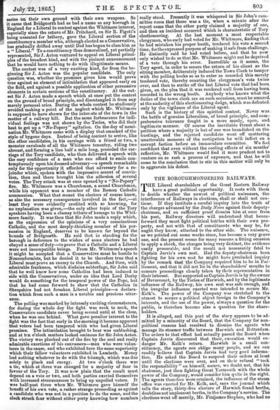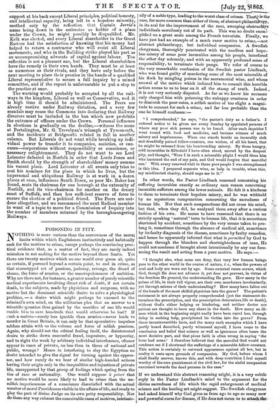THE BOROUGIBIONGERING RAILWAYS.
THE Liberal shareholders of the Great Eastern Railway have a great political opportunity. It rests with them to decide whether the newest of political nuisances, the interference of Railways in elections, shall or shall not con- tinue. If they institute a careful inquiry into the truth of the charges advanced by the Daily News against their deputy- chairman, and on sufficient proof dismiss him at once from his post, Railway directors will understand that hence- forward they most fight political battles with their own pro- perty, and not with that of constituents who may be, for aught they know, attached to the other side. The nuisance, as we pointed out some weeks since, has become a very grave one, and the present seems for many reasons a fitting occasion to apply a check, the charges being very distinct, the evidence easily procurable; and the result not necessarily fatal to Captain Jervis's own seat. Had the deputy-chairman been fighting for his own scat lie might have precluded inquiry by the remark that the Company required him to be in Par- liament, and that it did not lie in the shareholders' mouths to censure proceedings clearly taken by their representative in their interest. But supported as Captain Jervis is by the owner of Dovercourt, by the Tories of Harwich, and by the legitimate influence of the Railway, his own seat was safe enough, and the irregular influence exerted was intended to secure Mr. Kelk's. The power of the Company was stretched to the utmost to secure a political object foreign to the Company's interests, and the use of the power, always a question for the public, is therefore become also a question for the share- holders.
It is alleged, and this part of the story appears to be ad- mitted by a minority of the Board, that the Company for non- political reasons had resolved to dismiss the agents who manage its steamer traffic between Harwich and Rotterdam. The orders to that effect had actually passed the Board when Captain Jervis discovered that their, execution would en- danger Mr. Kelk's return. Harwich is a small con- stituency, the agents can oblige many people, and we can
informa-
tion. believe that Captain Jervis had very good nforma- tion. He asked the Board to suspend their orders at least until the elections were over, and on their refusal " took the responsibility" on himself, secure, wo doubt not, that his chairman, just then fighting Great Yarmouth with the whole power of the Company, would consider him quite in the right. The agents therefore were retained, the influence of the steam office was exerted for Mr. Belk, and, says the journal which tells the story, thirty-five electors of Harwich found berths, doubtless not unpleasant berths, in the Company's service. The elections went off merrily, Mr. Fitzjames Stephen, who had no
support at his back except Liberal principles, political honesty, and intellectual capacity, being left in a hopeless minority, soothed only by the reflection that Captain Jervis's name being down in the estimates as holder of -a place under the Crown, he might possibly be disqualified. Mr. Belk was elected, and every Liberal shareholder in the Great Eastern had the satisfaction of knowing that his money had helped to return a contractor who will resist all Liberal movements, and who in the Building strike played his part as an uncompromising advocate of capital against labour. The reflection is not a pleasant one, but the Liberal shareholders have the remedy in their own hands. They must be at least as numerous as their rivals, and they have only before the next meeting to place their proxies in the hands of a qualified Liberal representative to secure a full inquiry by a mixed committee, and if the report is unfavourable to put a stop to the practice at once.
The warning would probably be accepted by all the rail- ways in the kingdom, Liberal as well as Conservative, and it is high time it should be administered. The Peers are already restive under Railway dictation, and a very few scandals may rouse the Commons into declaring that Railway directors must be included in the ban which now prohibits the entrance of officers under the Crown. Personal influence in elections is gradually on the decline,—witness the scene at Portalington, Mr. G. Trevelyan's triumph at Tynemouth, and the incidents at Bridgnorth related in full in another column. But Liberals do not want while breaking up indi- vidual power to transfer it to companies, societies, or cau- cuses—corporations without responsibility or conscience, or necessary enlightenment. They do not want to see Lord Leicester defeated in Norfolk in order that Lords Jones and Smith should by the strength of shareholders' money assume his vacant place. Lord Leicester at all events only tries to seat his nominee for the place in which he lives, but the impersonal and ubiquitous Railway is at work in a dozen places at once, influences South Essex, as poor Mr. Baker has found, seats its chairman for one borough at the extremity of Norfolk, and its vice-chairman for another on the dreary coast of Suffolk, and then has sufficient reserve of force to ensure the election of a political friend. The Peers are out- done altogether, and we recommend the next Radical member in want of a topic to move for a Commission of Inquiry into the number of members returned by the boronghmongering Railways.































 Previous page
Previous page